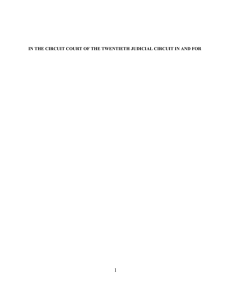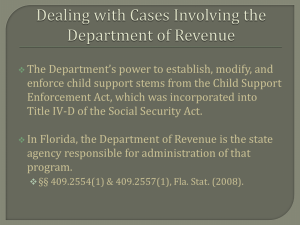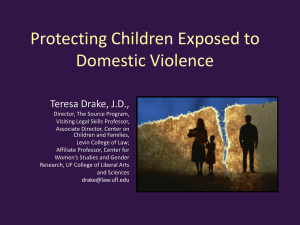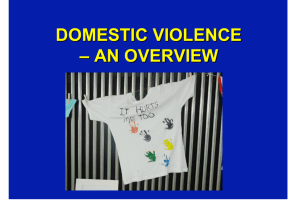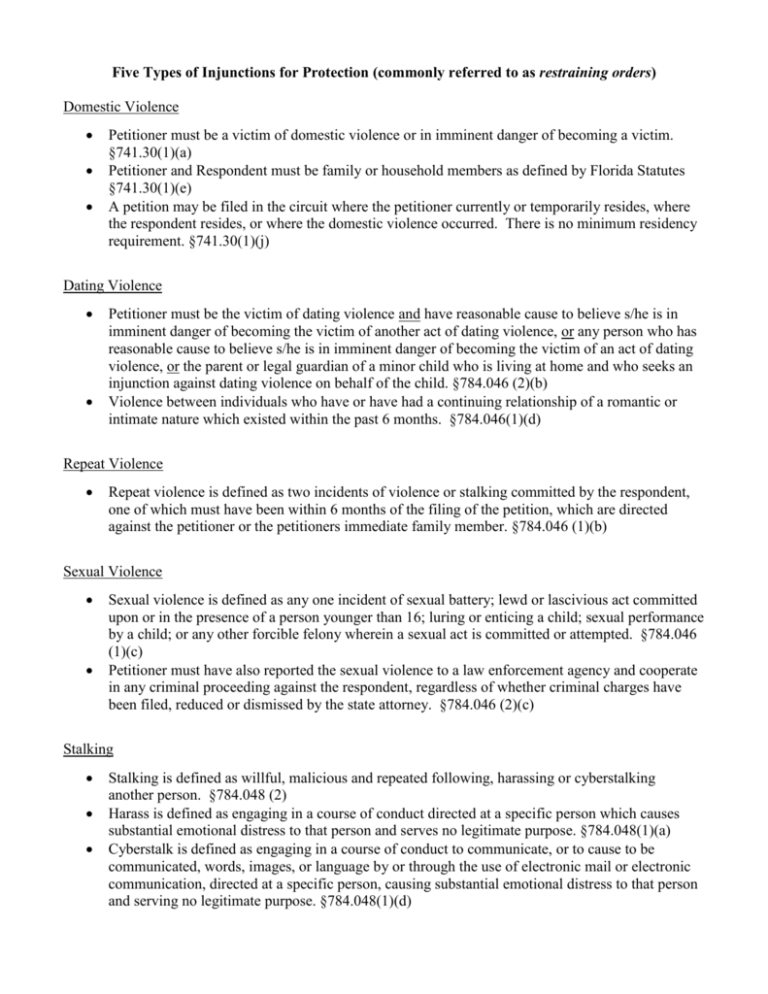
Five Types of Injunctions for Protection (commonly referred to as restraining orders)
Domestic Violence
Petitioner must be a victim of domestic violence or in imminent danger of becoming a victim.
§741.30(1)(a)
Petitioner and Respondent must be family or household members as defined by Florida Statutes
§741.30(1)(e)
A petition may be filed in the circuit where the petitioner currently or temporarily resides, where
the respondent resides, or where the domestic violence occurred. There is no minimum residency
requirement. §741.30(1)(j)
Dating Violence
Petitioner must be the victim of dating violence and have reasonable cause to believe s/he is in
imminent danger of becoming the victim of another act of dating violence, or any person who has
reasonable cause to believe s/he is in imminent danger of becoming the victim of an act of dating
violence, or the parent or legal guardian of a minor child who is living at home and who seeks an
injunction against dating violence on behalf of the child. §784.046 (2)(b)
Violence between individuals who have or have had a continuing relationship of a romantic or
intimate nature which existed within the past 6 months. §784.046(1)(d)
Repeat Violence
Repeat violence is defined as two incidents of violence or stalking committed by the respondent,
one of which must have been within 6 months of the filing of the petition, which are directed
against the petitioner or the petitioners immediate family member. §784.046 (1)(b)
Sexual Violence
Sexual violence is defined as any one incident of sexual battery; lewd or lascivious act committed
upon or in the presence of a person younger than 16; luring or enticing a child; sexual performance
by a child; or any other forcible felony wherein a sexual act is committed or attempted. §784.046
(1)(c)
Petitioner must have also reported the sexual violence to a law enforcement agency and cooperate
in any criminal proceeding against the respondent, regardless of whether criminal charges have
been filed, reduced or dismissed by the state attorney. §784.046 (2)(c)
Stalking
Stalking is defined as willful, malicious and repeated following, harassing or cyberstalking
another person. §784.048 (2)
Harass is defined as engaging in a course of conduct directed at a specific person which causes
substantial emotional distress to that person and serves no legitimate purpose. §784.048(1)(a)
Cyberstalk is defined as engaging in a course of conduct to communicate, or to cause to be
communicated, words, images, or language by or through the use of electronic mail or electronic
communication, directed at a specific person, causing substantial emotional distress to that person
and serving no legitimate purpose. §784.048(1)(d)
The Florida Supreme Court has authorized standard forms for filing injunctions for protection.
These can be filed directly with the clerk or through the e-portal.
There is no filing fee when filing a petition for injunction for protection
Petitions for injunction for protection are reviewed within hours of filing.
The Court will assess the facts and if sufficient evidence exists, a temporary injunction for
protection will be issued. The Court may also set the matter for a hearing without the issuance of
an injunction for protection. In either case, the Respondent will be personally served by the sheriff
with the petition, temporary injunction (if issued) and the date and time of the scheduled hearing.
If legally insufficient, the Court may deny the petition for injunction.
It is the Petitioner’s responsibility to follow up with the clerk regarding the Court’s decision.
A hearing will be scheduled within 15 days of the issuance of a temporary injunction for
protection. F.S. §§741.30(5)(c); 784.046(6)(c); 784.0485(5)(c)
Pursuant to Florida Family Law Rule of Procedure 12.610(c)(4)(A) and Florida Statutes
§784.046(6)(c) The court may grant a continuance of the temporary injunction and of the full
hearing for good cause shown by any party, or upon its own motion for good cause, including
failure to obtain service.
Important to remember for hearings: The rules of evidence apply!
PERTINENT CASE LAW
Reasonable person standard:
Gustafson v. Mauck, 743 So. 2d 614 (Fla. 1st DCA 1999) The statutory standard is an objective one.
Oettmeier v. Oettmeier, 960 So. 2d 902 (Fla. 2d DCA 2007) Although an act of domestic violence need
not be completed before one may seek injunctive relief, if fear alone is the “reasonable cause” alleged to
support the injunction, then not only must the danger feared be imminent but the rationale for the fear
must be objectively reasonable as well.
Jones v. Jones, 32 So. 3d 772 (Fla. 2d DCA 2010) citing Giallanza v. Giallanza, 787 So. 2d 162 (Fla. 2d
DCA 2001). In determining whether the victim’s fear is reasonable, “the trial court must consider the
current allegations, the parties’ behavior within the relationship, and the history of the relationship as a
whole.”
Muse v. Muse, 27 So. 3d 232 (Fla. 2d DCA 2010) Subjective fear is insufficient to warrant the entry of an
injunction.
Threats alone, without overt acts and without meeting the definition of stalking, are insufficient to support
the entry of an injunction for protection:
Russell v. Doughty, 28 So. 3d 169 (Fla. 1st DCA 2010)
Clement v. Ziemer, 953 So. 2d 700 (Fla. 5th DCA 2007)
Allegations of Domestic Violence by a parent against a child:
G.C. v. R.S. (parent) and K.C. (minor), 71 So. 3d 164 (Fla. 1st DCA 2011) Reasonable parental discipline
does not constitute domestic violence by a parent against a minor child.
Seffernick v. Meriwether, 960 So. 2d 851 (Fla. 2d DCA 2007) The mother reportedly attempted suicide
and was ultimately Baker Acted. In the course of events, she grabbed at the minor child being held by the
father. These facts were insufficient to support a finding the child was in imminent danger and the trial
court should not have entered an injunction of protection on the minor’s behalf.
O’Neill v. Stone, 721 So. 2d 393 (Fla. 2d DCA 1998) “This case is a perfect example of why domestic
violence proceedings should not be allowed to become the primary forum in which custody, visitation and
support issues are litigated.” See also Spano v. Bruce, 947 So. 2d 635 (Fla. 3d DCA 2007)
Jurisdiction when act occurred out of state and Respondent lives out of state:
Becker v. Johnson, 937 So. 2d 1128 (Fla. 1st DCA 2006) To be subject to the jurisdiction of Florida
courts pursuant to [the injunction] statute[s], due process requires there also be sufficient “minimum
contacts” between the forum state and the non-resident defending party[.]
Stipulations between the parties:
DeMatteo v. Sheau, 62 So. 3d 1208 (Fla. 4th DCA 2011) The trial court retains jurisdiction to modify or
enforce an agreement reached along with a voluntary dismissal.

